Rousseau was a philosopher and political theorist who had a significant impact on Enlightenment ideas and politics. His main ideas include the theory of the social contract: natural state, popular sovereignty and natural education. His best-known works are “On the Social Contract” and “Emílio, or Education”. His philosophy influenced both liberal and socialist thought, and his ideas continue to be discussed and debated to this day.
By understanding the Rousseau's main ideas, we can better understand the Rousseau's political theory, the concepts of his philosophy and how his works impacted political and educational thought. Let's explore each of these aspects in detail, examining the contrato social: natural state, popular sovereignty, natural education and his main works.
Rousseau's Main Ideas – Main Conclusions
- The theory of the social contract is one of the oldest and Rousseau's main ideas
- O natural state is a fundamental concept in his philosophy
- Rousseau defended the popular sovereignty as a legitimate form of government
- A natural education based on human development was one of his most important contributions
- Rousseau's best-known works are “On the Social Contract” and “Emilio, or Education”
Rousseau's Life and Biography
Jean-Jacques Rousseau was born in Geneva, Switzerland, in 1712. Raised by his maternal uncle after his mother's death, Rousseau had a self-taught education. Initially he worked as an engraver, but later he turned his path towards philosophy. His philosophy was deeply influenced by the intellectual movement known as the Enlightenment and by contractualist thought.
Rousseau had a troubled life, experiencing persecution and exile. Despite this, his ideas had a significant impact on political and philosophical thought. His biography reflects the personal challenges he faced and the historical context in which he lived, shaping his convictions and theories.
| Year | Event |
|---|---|
| 1712 | Birth of Jean-Jacques Rousseau in Geneva, Switzerland |
| 1715 | Death of his mother |
| 1722 | Start self-taught education |
| 1728-1742 | Works as an engraver's apprentice |
| 1742 | Moves to Paris and dedicates himself to music and writing |
| 1750 | Publishes the “Discourse on Sciences and the Arts” |
| 1755 | Publishes the “Discourse on the Origin of Inequality Among Men” |
| 1762 | Publishes “Of the Social Contract” and “Emílio, or Education” |
| 1778 | Death of Jean-Jacques Rousseau in Ermenonville, France |
Among his main works, “On the Social Contract” and “Emílio, ou da Educação” stand out. These and other writings by Rousseau reflect his philosophical and political convictions, leaving an impactful legacy on Western thought.
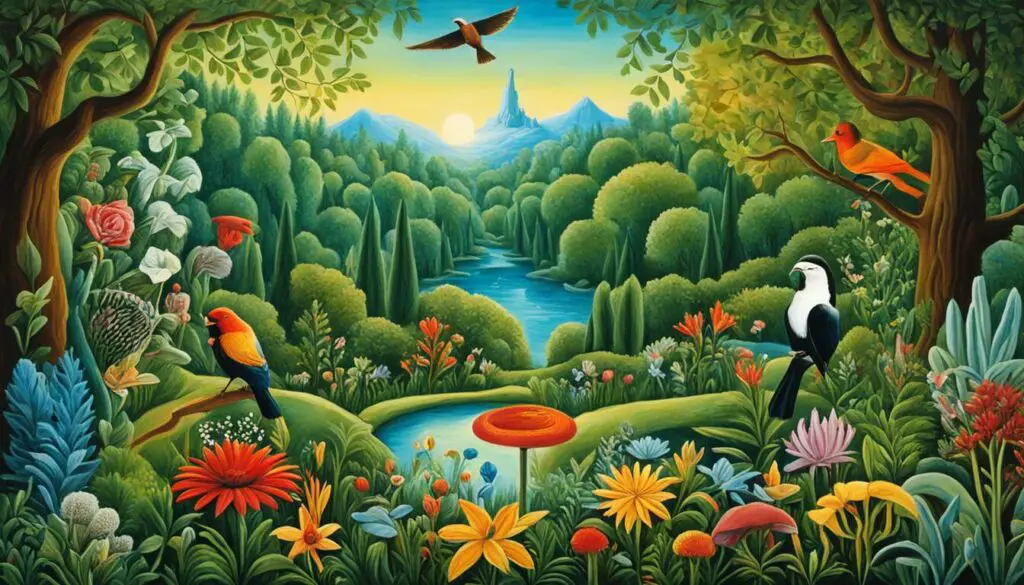
Social Contract and State of Nature
One of the Rousseau's main ideas is the theory of the social contract. According to Rousseau, human beings lived in a state of nature, where they were free and equal. However, the emergence of private property and civil society led to inequality and moral corruption. To remedy this, individuals must agree to form a contrato social, where they give up part of their freedom in exchange for the security and protection provided by the State. In this contract, popular sovereignty is established, and the government is responsible for governing in accordance with the general will of the people.
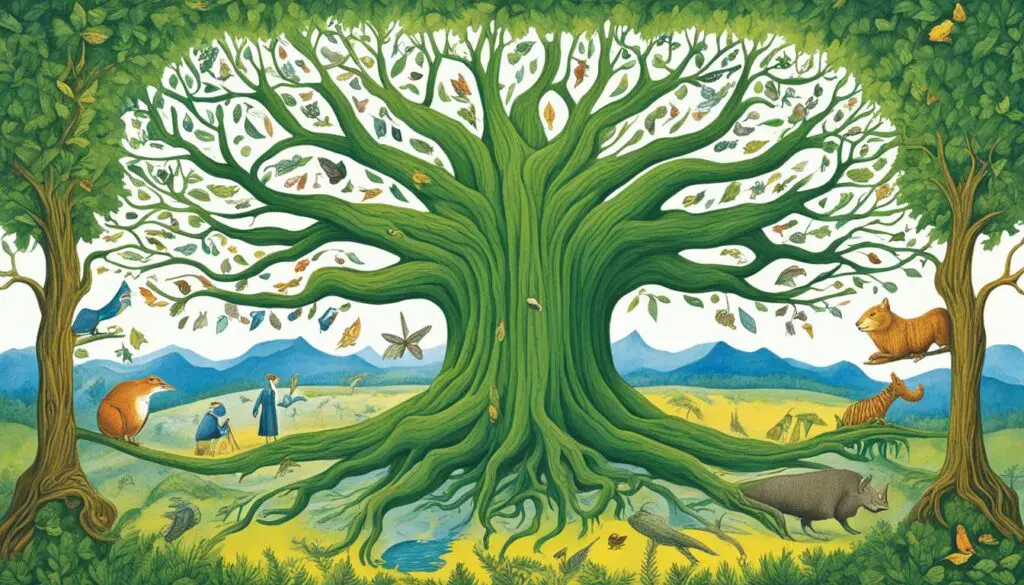
Popular Sovereignty and Political Participation
One of Rousseau's central ideas is the popular sovereignty, which means that political power in a society must derive from the people as a whole. For Rousseau, the democracia It is the most legitimate form of government, as it allows the people to exercise their will and actively participate in political decision-making. He believed that popular sovereignty could be achieved through popular assemblies and direct participation in political decisions. His idea of popular sovereignty had a great influence on the development of modern democratic theories.
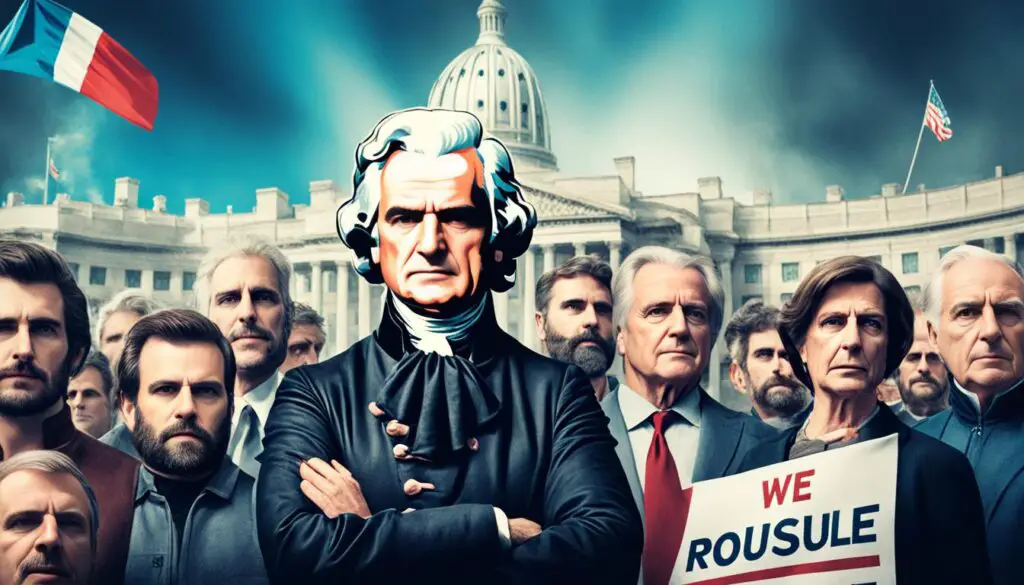
| Main concepts | Rousseau's influence |
|---|---|
| Popular sovereignty | Rousseau argued that political power in a society must be exercised by the people as a whole, through direct participation in political decisions. |
| Political participation | For Rousseau, it is essential that citizens actively participate in political decision-making, through popular assemblies and the expression of their will. |
| Democracia | Rousseau considered the democracia as the most legitimate form of government, as it allows the expression of the will of the people and the political participation of all citizens. |
| Rousseau's political concept | Rousseau's central political concept is based on the idea that popular sovereignty must be exercised through political participation direct, guaranteeing the expression of the general will of the people. |
Natural Education and Human Development
Rousseau also left a great legacy in the area of education. He believed in the importance of natural education, which consists of allowing children to grow according to their nature and pace of development. For Rousseau, education must be based on the freedom and uniqueness of each individual, seeking to develop their natural capabilities. He argued that education should be aimed at moral and social development, in addition to intellectual development. Your work “Emile, or Education” It is considered one of the main works on education ever written.
A natural education proposed by Rousseau is based on the idea that each child has a unique nature and their own pace of development. He believed that children should be free to explore and discover the world around them, as opposed to a rigid, standardized educational model. According to Rousseau, education should be a process of gradual development, allowing the child to develop according to their individual capabilities and interests.
“Childhood has its own ways of seeing, thinking and feeling that are then lost. If we don’t take advantage of them, we lose them forever.”
– Jean-Jacques Rousseau
The natural education proposed by Rousseau also emphasizes the moral and social development of the individual. For him, education should not be limited only to the intellectual aspect, but should also cultivate virtues such as kindness, friendship and justice. Rousseau believed that education plays a crucial role in shaping a person's character and personality, helping him or her become a responsible and ethical member of society.
Rousseau's influence on education
Rousseau's ideas about education had a significant impact on educational theory. His defense of natural education and human development has influenced thinkers and education reformers over the centuries. Its concepts have been incorporated into different educational approaches and philosophies.
- Montessori method: The pedagogy developed by Maria Montessori is based on many principles of natural education proposed by Rousseau. The Montessori method emphasizes children's freedom, autonomy and individual development, allowing them to learn through exploration and hands-on activity.
- Progressive Education: Progressive education, especially represented by the ideas of John Dewey, was also influenced by Rousseau. This approach emphasizes experiential learning and the student's active involvement in the learning process, focusing on integral and democratic development.
- Libertarian Pedagogy: Libertarian pedagogy proposes an education based on freedom and respect for students' rights and interests. This approach, influenced by thinkers such as Paul Goodman and Alexandre S. Neill, seeks to break with authoritarian structures and promote student self-determination.
A Rousseau's influence on education is evident to this day, with his ideas being debated and implemented in different educational contexts. His vision of an education that prioritizes human development and individual freedom continues to inspire educators and shape the field of pedagogy.

Rousseau's Main Works
Rousseau wrote several works that became references in political and educational philosophy. His main works include “On the Social Contract”, where he develops his political theory of contrato social, and “Emílio, ou da Educação”, where he explores his educational theory. In addition to these works, he also wrote “Discourse on the Origin of Inequality Among Men” and “Discourse on the Sciences and the Arts”.
Through his works, Rousseau had a great impact on the political and philosophical thought of the time, and the influence of his ideas continues to this day.
Rousseau's works
| Construction | Overview |
|---|---|
| “Of the Social Contract” | Develops the political theory of the social contract, exploring concepts such as popular sovereignty and the relationship between the individual and the State. |
| “Emile, or Education” | Explores his educational theory, defending the importance of natural education and human development in the formation of children. |
| “Discourse on the Origin of Inequality Among Men” | Addresses the origin and consequences of social inequality, criticizing private property and the harmful influence of society on human nature. |
| “Discourse on the Sciences and the Arts” | It reflects on the relationship between the intellectual and moral progress of humanity and the influence of science and the arts on social and individual development. |
These landmark works demonstrate the depth and originality of Rousseau's thought, and its impact on political and educational philosophy still reverberates in contemporary debates.
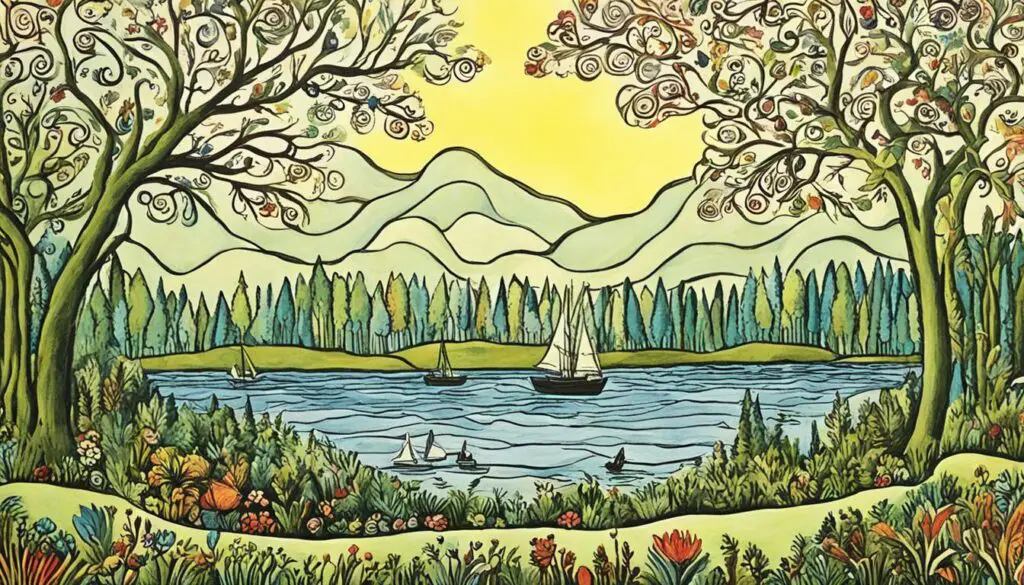
Impact and Criticism of Rousseau's Ideas
Rousseau's ideas had a significant impact on political and philosophical thought, being considered both a basis for liberalism and socialism. His theories on popular sovereignty, the social contract and criticism of private property influenced thinkers such as Karl Marx and Friedrich Engels, who developed communist theory.
However, Rousseau's ideas also received criticism, both from conservatives and other Enlightenmentists. Some criticized his lack of rational foundation, while others questioned his idealized view of the state of nature and his denial of the need for civil society.
Rousseau's influence on Communism
Rousseau had a great influence on the development of communism, especially through his criticism of private property and social inequality. Karl Marx and Friedrich Engels, two of the main theorists of communism, found inspiration in Rousseau's ideas to develop their theory. They argued that private property was the root of inequality and exploitation of the working class, and advocated a society based on equality and collective ownership of the means of production.
O Rousseau's impact in communism can be seen in Marx's famous phrase: “Rousseau's theory of class is present wherever there is a relentless critique of social divisions”. Rousseau's writings influenced the way communism was conceived and also left a permanent mark on politics and ideology.
“Rousseau’s class theory is present wherever there is a relentless critique of social divisions.” - Karl Marx
Rousseau's critics
Despite his lasting influence, Rousseau has also had his critics throughout history. Some conservatives questioned his ideas about human nature and society, arguing that Rousseau's views were idealized and did not take into account the complexities of real life.
Other Enlightenment philosophers were also critical of Rousseau's ideas. Voltaire, for example, questioned Rousseau's emphasis on emotion and intuition at the expense of reason. He argued that reason was the best guide to human action and criticized Rousseau's view that society and civilization were negative for human nature.
Criticism of Rousseau's Ideas
- Some criticisms point to the lack of rational foundation in their theories.
- Others question their idealized view of state of nature.
- Some conservatives questioned his ideas about human nature and society.
- Voltaire criticized Rousseau's emphasis on emotion and intuition at the expense of reason.
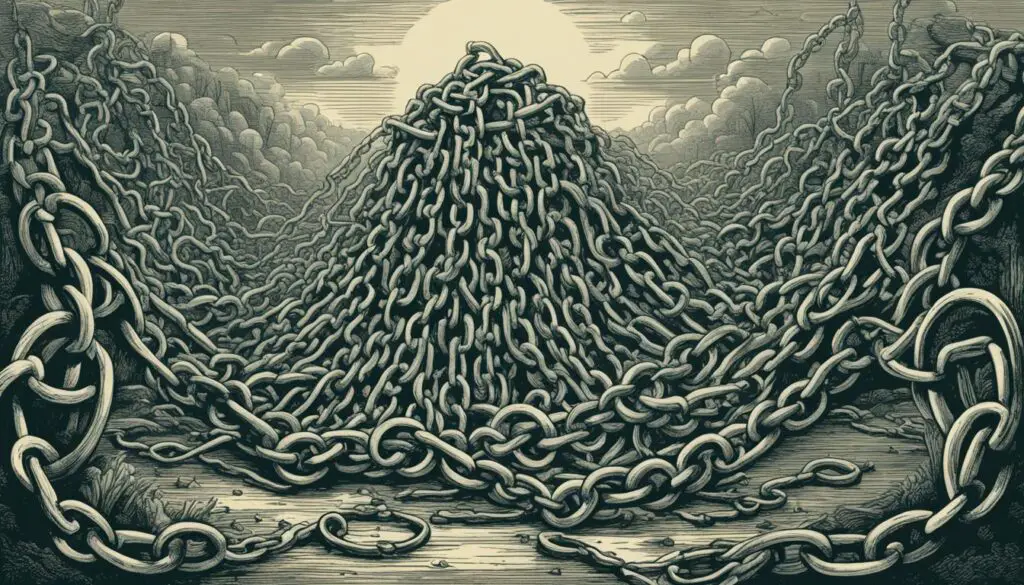
However, the impact that Rousseau's ideas have had on politics, philosophy and culture to this day is undeniable. His defense of popular sovereignty, the social contract and the ideal of a more egalitarian society continue to be relevant and important themes for understanding and reflecting on human nature, social organization and politics.
Rousseau's Philosophical Legacy
O Rousseau's philosophical legacy is of extreme importance and its ideas continue to be discussed and debated to this day. His influence on political and educational philosophy is notable, leaving a lasting mark on contemporary thought.
One of the crucial aspects of Rousseau's philosophical legacy it is his defense of popular sovereignty and political participation. He argued that political power should derive from the people as a whole, promoting democracia as the most legitimate form of government. These ideas influenced the formation of political movements and had a lasting impact on political theory.
Another important aspect of Rousseau's legacy It is his vision of education centered on human development. He believed that education should be based on freedom and respect for each person's individuality. His work “Emílio, ou da Educação” is considered one of the main works on education ever written, influencing educational theories and practices to this day.
Furthermore, Rousseau also brought a scathing critique of individualism and social inequality. He argued that private property and the pursuit of material progress had led to a society marked by injustice and corruption. His criticisms of the social and economic system continue to be relevant and spark reflections on the inequalities present in today's society.
O Rousseau's philosophical legacy It is not just restricted to political and educational philosophy. Its influence can be seen in different areas, from music and literature to feminism and environmentalism. Thinkers and movements throughout history have been influenced by Rousseau's ideas, recognizing their relevance and contribution to human thought.
In short, Rousseau's philosophical legacy is vast and impactful. His ideas about popular sovereignty, political participation, education, and critiques of individualism continue to play an important role in understanding contemporary politics and society.
Main Criticisms of Rousseau's Ideas
Rousseau's ideas have also received criticism throughout history. Some consider his social contract theory to be unrealistic and based on historically unproven assumptions.
Furthermore, his idealized vision of the state of nature and his defense of popular sovereignty were the target of criticism, both from conservatives and other Enlightenment philosophers.
Thinkers such as Voltaire questioned Rousseau's view of human nature and his denial of rationality as a guide for human action.
“I believe that Rousseau was carried away by his admiration for nature when defending the state of nature as something idyllic. Disregarding reason as something fundamental to human action ends up weakening your argument.” – Voltaire
| Critical Thinker | Top Reviews |
|---|---|
| Voltaire | He questioned Rousseau's view of human nature and his denial of rationality. |
| Edmund Burke | He criticized the idea of popular sovereignty, arguing that it could lead to chaos and tyranny of the majority. |
| Hannah Arendt | He argued that Rousseau's view of human nature ignored the importance of political action and community life. |
Despite the criticism, the impact that Rousseau's ideas had on political and philosophical thought is undeniable, influencing both liberalism and socialism and still being the subject of study and debate to this day.
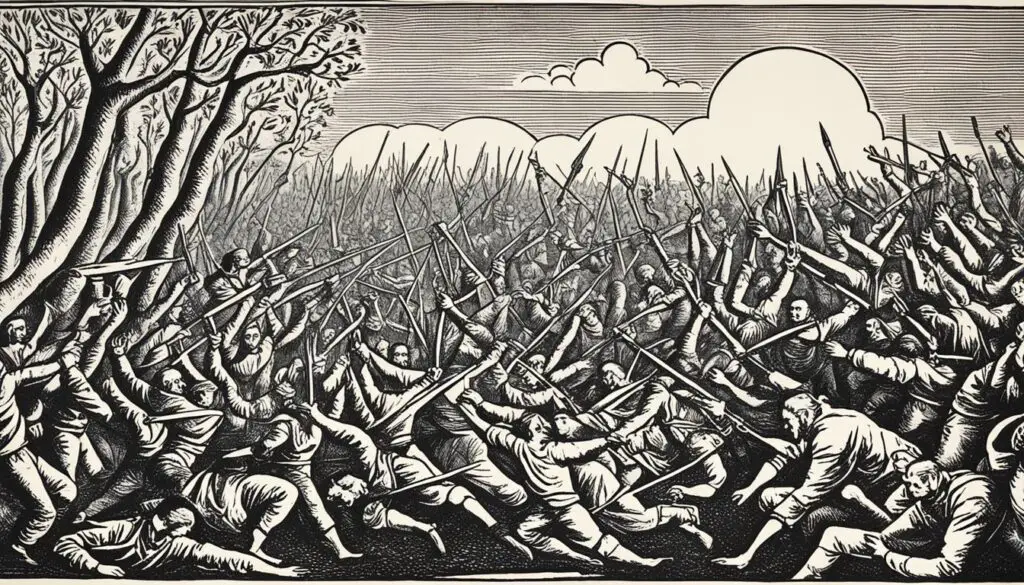
Rousseau's works
Rousseau was a prolific philosopher, author of several works that played a fundamental role in the development of political and educational thought. His three main works are: “On the Social Contract”, “Emílio, ou da Educação” and “Discourse on the Origin of Inequality Among Men”.
“On the Social Contract” is considered one of the most influential works of political philosophy. In it, Rousseau explores his theory of the social contract, arguing that sovereignty resides in the people and that government should be based on the general will of the community.
“Emile, or Education” is a treatise on education, in which Rousseau defends an approach centered on the child's nature and individual development. He criticizes traditional educational methods and proposes a more humanistic and individualized approach.
“Discourse on the Origin of Inequality Among Men” addresses the issue of social inequality and its causes. Rousseau argues that inequality arises with the establishment of private property and the introduction of social conventions, moving human beings away from their originally good and egalitarian nature.
| Construction | Overview |
|---|---|
| Articles of Incorporation | Political theory on the origin and foundations of the State and the social contract. |
| Emílio, or Education | Treatise on education, defends a focus on nature and individual development. |
| Discourse on the Origin of Inequality Among Men | Addresses the issue of social inequality and its causes, criticizing the emergence of private property. |

Rousseau's Influence on Culture and Politics
A Rousseau's influence it goes beyond philosophy and has a significant impact on culture and politics. His defense of freedom, equality and popular participation has inspired political and social movements throughout history, from the French Revolution to contemporary civil and social rights movements. Furthermore, his emphasis on the importance of nature and his critique of material progress influenced environmentalist culture and thought.
“Culture is contrary to nature. Instead of improving it, we destroy it and replace it with a fictitious and artificial life.”
~ Jean-Jacques Rousseau
A Rousseau's philosophy It had a profound impact on various aspects of culture. His critical approach to material progress and his defense of nature and simplicity influenced artistic movements such as Romanticism and the hippie movement. The idea of returning to our origins and valuing freedom and authenticity also found an echo in music, literature and cinema. Rousseau's figure of the “natural man” inspired artists and thinkers to question social norms and seek a freer and more authentic form of expression.
In the political field, Rousseau's ideas had a great impact. His defense of popular sovereignty influenced the development of modern democracies and inspired revolutionary movements in search of political participation and representation. The notion that political power should derive from the people as a whole and not from a ruling elite was fundamental to the formation of governments based on the popular will. Movements such as socialism and communism were also influenced by Rousseau's ideas, especially in relation to the pursuit of equality and social justice.
Furthermore, Rousseau also influenced a number of thinkers and philosophers throughout history. His work influenced everyone from Friedrich Nietzsche and Sigmund Freud to educational theorists such as Paulo Freire. Rousseau's emphasis on the importance of natural education and human development also influenced the field of psychology, leading to the development of theories about child development and personality formation.
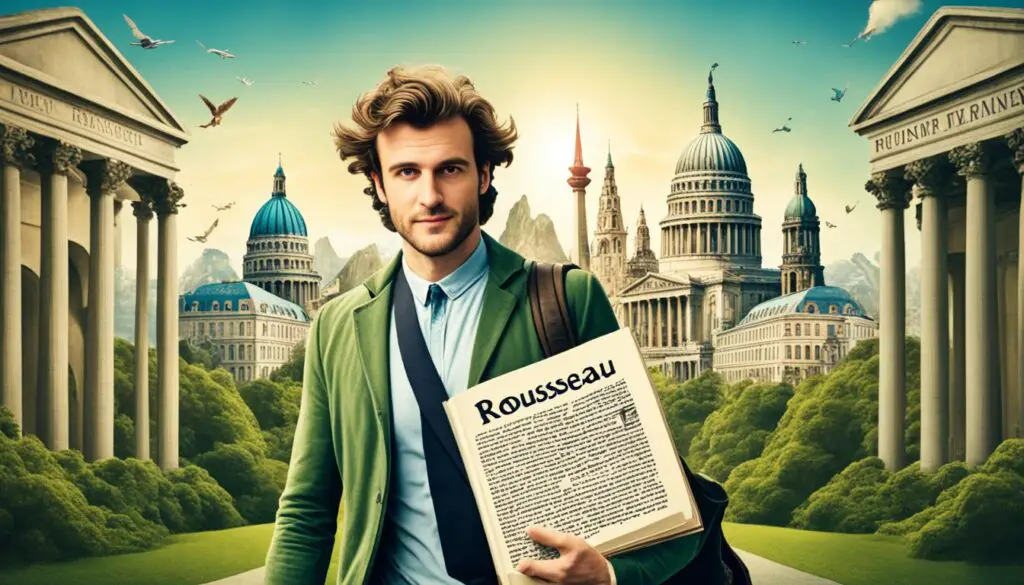
However, just as his ideas were influential, Rousseau also faced criticism. Some argued that his idealized view of the state of nature was naive and did not correspond to historical reality. Others criticized his ideas about natural education, questioning the feasibility of implementing them in practice. Despite criticism, the Rousseau's influence in culture and politics continues to be significant, and its ideas continue to be the subject of study and debate.
Conclusion
Rousseau was one of the most important philosophers of the Enlightenment, leaving a lasting and impactful legacy in the areas of political and educational thought. His ideas about the social contract, popular sovereignty, and natural education continue to be studied and debated to this day, having influenced both liberalism and socialism.
His works, such as “On the Social Contract” and “Emílio, ou da Educação”, are considered fundamental for understanding the development of Western political and philosophical thought. By emphasizing the importance of popular participation, individual freedom and education centered on human development, Rousseau made significant contributions to the conception of society and government.
O Rousseau's legacy it is reflected not only in philosophy, but also in contemporary culture, politics and society. His defense of freedom, equality and popular participation inspired political and social movements throughout history, as well as influencing environmentalist thought with his criticism of material progress.
In short, Rousseau's ideas continue to play an important role in understanding politics and society. His impact and importance are evident both in the historical influence of his works and in his lasting legacy, which continues to shape present-day philosophical and political debates and reflections.
FAQ
Q: What are Rousseau's main ideas?
A: Rousseau's main ideas include social contract theory, the natural state, popular sovereignty, and natural education.
Q: What are the key concepts of Rousseau's political theory?
A: The key concepts of Rousseau's political theory are the social contract, the state of nature, the civil society and popular sovereignty.
Q: What were Rousseau's best-known works?
A: Rousseau’s best-known works are “On the Social Contract” and “Emile, or Education”.
Q: What were Rousseau's main contributions to philosophy?
A: Rousseau's main contributions to philosophy include his ideas on the social contract, democracy, natural education and criticism of social inequality.
Q: Who was Jean-Jacques Rousseau?
A: Jean-Jacques Rousseau was a Swiss philosopher and political theorist born in 1712, who had a significant impact on Enlightenment thought and politics.
Q: What were the main influences on Rousseau's life and work?
A: The main influences on life and work of Rousseau were the Enlightenment and contractualist thinking.
Q: What is Rousseau's social contract?
A: Rousseau's social contract is the idea that individuals must agree to form a contract where they give up part of their freedom in exchange for the security and protection provided by the state.
Q: What does Rousseau understand by state of nature?
A: For Rousseau, the state of nature is the state in which human beings lived free and equal before the emergence of private property and civil society.
Q: What does popular sovereignty mean to Rousseau?
A: For Rousseau, popular sovereignty means that political power in a society must derive from the people as a whole, with democracy being the most legitimate form of government.
Q: How important is natural education in Rousseau's philosophy?
A: Natural education is important in Rousseau's philosophy as it seeks to allow children to grow according to their nature and pace of development, emphasizing moral and social development, in addition to intellectual development.







